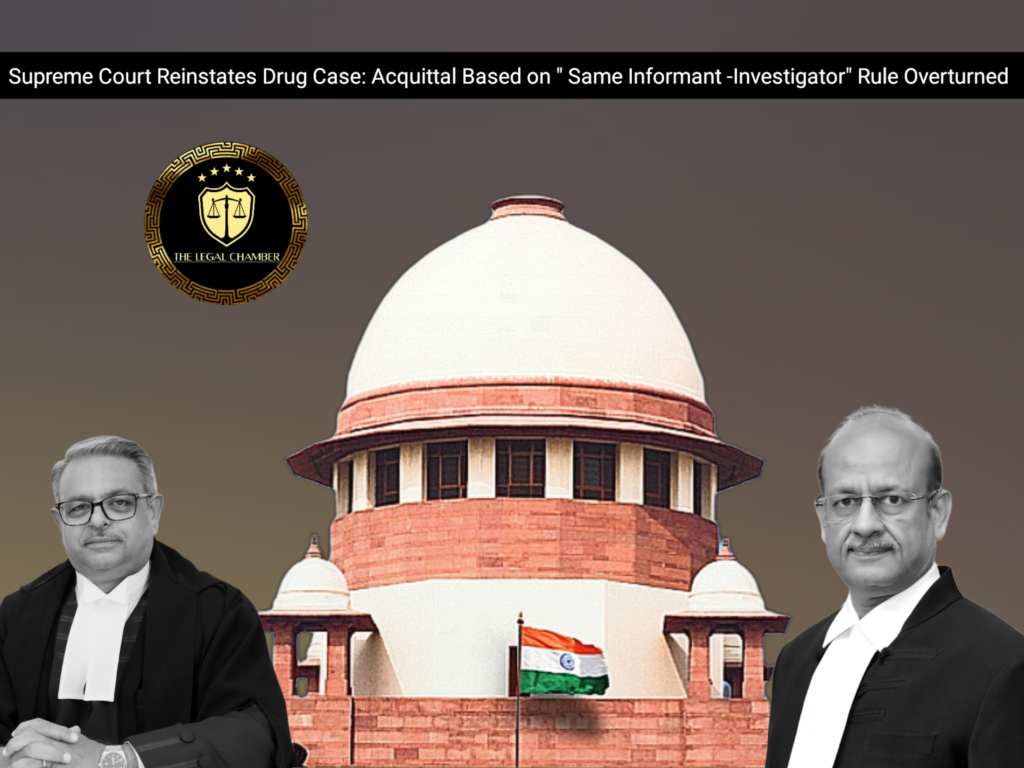
The Supreme Court held that an investigation is not automatically vitiated solely because the informant and investigator are the same. This procedural irregularity must be examined on a case-specific basis for bias. The Court overruled the contrary precedent in Mohan Lal and restored the matter for a merits-based hearing.
Facts Of The Case:
Based on the secret information received on September 20, 2009, police intercepted a truck. The respondent, Gurnam @ Gama, was found sitting on a stack of bags in the cargo area, while the other respondent, Jaswinder Singh, was driving the vehicle. Upon search, the authorities recovered a significant quantity of 750 kilograms of poppy husk along with two motorcycles. Consequently, FIR No. 221 of 2009 was registered under the relevant sections of the NDPS Act, 1985. After a full trial, the Special Court in Jalandhar convicted both accused on December 11, 2010, sentencing each to 12 years of rigorous imprisonment and a fine of ₹1 lakh. Their conviction was solely overturned by the Punjab & Haryana High Court on December 11, 2018, relying on the legal principle established in Mohan Lal v. State of Punjab, which mandated that the informant and investigator cannot be the same person, without examining the merits of the evidence. The State of Punjab appealed this acquittal to the Supreme Court.
Procedural History:
The case originated from the conviction of the respondents by the Trial Court (Special Court, Jalandhar) on December 11, 2010. Aggrieved by this decision, the respondents filed criminal appeals before the High Court of Punjab and Haryana. In a judgment dated December 11, 2018, the High Court allowed the appeals and acquitted the respondents. This decision was based solely on the legal principle established in Mohan Lal v. State of Punjab (2018), which held that an investigation is fundamentally unfair if the informant and the investigator are the same person; the High Court did not assess the evidence on merits. The State of Punjab then filed Special Leave Petitions before the Supreme Court, which, after condoning a delay, granted leave and registered the present criminal appeals. The Supreme Court ultimately allowed the State’s appeals, set aside the High Court’s acquittal, and remanded the case back to the High Court for a fresh consideration on the merits of the evidence.
READ ALSO :Supreme Court: Company Balance Sheets Can Reset Limitation Clock for Creditors Under IBC
Court Observation:
The Supreme Court made several critical observations. It held that the rule established in Mohan Lal—that the informant and investigator must not be the same person—cannot be applied as a rigid, automatic mandate for acquittal in all cases that were pending prior to that judgment. The Court emphasized that the criminal justice system requires a balance between the rights of the accused and the prosecution, and a procedural irregularity cannot become a springboard for acquittal without examining the facts. Crucially, it affirmed the subsequent Constitution Bench ruling in Mukesh Singh, which overruled Mohan Lal, stating that an investigation is not automatically vitiated solely on the ground of the informant and investigator being the same. The question of bias must be determined on a case-to-case basis after evaluating the specific facts and circumstances.
Final Decision & Judgement:
The Supreme Court allowed the appeals filed by the State of Punjab. It set aside the impugned judgment of the High Court which had acquitted the respondents solely on the legal ground derived from Mohan Lal. The Court held that the acquittal, based on a technicality that was subsequently overruled, was unsustainable. Consequently, the matter was remitted back to the High Court for a fresh and thorough hearing on the merits of the evidence presented during the trial. The Supreme Court specifically requested the High Court to expedite the hearing, considering the appeals originated from a 2010 conviction.
Case Details:
Case Title: State of Punjab vs. Gurnam @ Gama Etc. Citation: 2025 INSC 960 Criminal Appeal No.: Criminal Appeal Nos. 2836-2837 of 2025 Date of Judgement: July 30, 2025 Judges/Justice Name: Justice Rajesh Bindal and . Justice Augustine George Masih
Download The Judgement Here